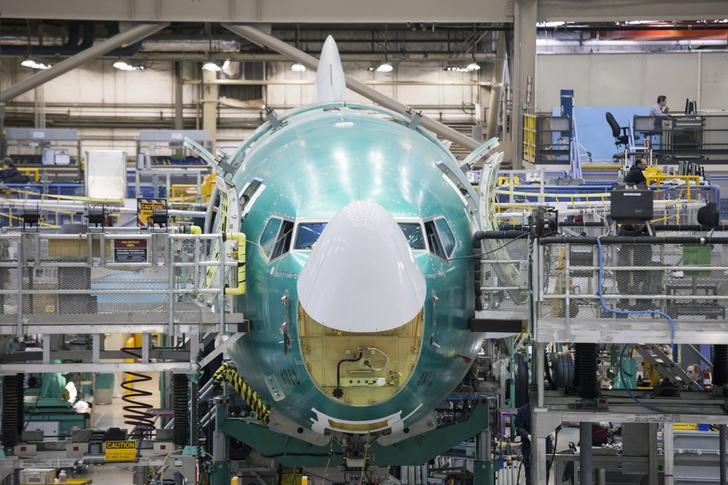On Thursday, BofA Securities adjusted its price target on shares of Boeing (NYSE:BA), increasing it from $180 to $200, while maintaining a Neutral stance on the stock. The revision reflects a market re-rating to a 4.5% free cash flow (FCF) yield, up from the previous 5.0%. BofA Securities highlighted Boeing's recent performance, noting a 4.2% increase in the stock's value in June, outpacing the S&P 500's 1.7% gain during the same period.
This upward movement has shifted Boeing's position from the fifth worst to the twelfth worst performer in the S&P 500 year-to-date. The firm acknowledged that Boeing has somewhat de-risked its 2024 earnings expectations following a late May announcement that indicated a shift from burning cash to generating low single-digit billion in FCF.
Boeing's advantageous position in the robust air traffic demand environment, supported by the market power of the aerospace duopoly, was also mentioned as a positive factor.
Despite these strengths, BofA Securities noted that Boeing faces several challenges that could affect its operational turnaround. These include the pending closure of the Spirit AeroSystems (NYSE:SPR) deal, ongoing CEO search, labor union negotiations, and financing concerns. Such uncertainties are factors in the firm's decision to reiterate a Neutral rating on Boeing's stock.
The report further delves into the key arguments from investors that are bullish and bearish on Boeing. The bullish view is supported by the company's strategic positioning in a strong demand market for air travel, while the bearish perspective is cautious about the immediate hurdles that could impede the company's recovery and growth in the near term. The price target increase to $200 reflects a more optimistic valuation of Boeing's future cash flow potential.
In other recent news, Boeing has been under scrutiny regarding the 737 MAX crashes and the company's compliance with a deferred prosecution agreement (DPA) with the U.S. Justice Department.
Simultaneously, the Federal Aviation Administration (FAA) has decided to indefinitely extend its increased oversight of Boeing and its key supplier, Spirit AeroSystems. This decision was made following an in-flight emergency involving an Alaska Airlines Boeing 737 MAX 9 earlier this year.
Boeing has also reported a significant drop in plane deliveries for May, with only 24 commercial jets delivered, marking a 52% decrease from the same month in the previous year.
The company has secured four gross new orders in May, all for 787-10 Dreamliners destined for Eva Air, bringing the company's gross order count to 142 for the year to date.
In the financial world, UBS has adjusted Boeing's price target downwards to $240, while maintaining a Buy rating on the aerospace giant's shares. This revision comes in light of Boeing's guidance for relatively unchanged aircraft deliveries in the second quarter compared to the first. UBS predicts Boeing will deliver 400 MAX aircraft and 70 units of the 787 model in 2024.
In the realm of space travel, Boeing's Starliner spacecraft successfully docked at the International Space Station (ISS) with NASA astronauts onboard. This achievement marks a crucial milestone for Boeing, positioning Starliner as a potential competitor to SpaceX's Crew Dragon capsule. These recent developments underscore Boeing's progress in both the commercial aviation and space travel sectors.
InvestingPro Insights
As Boeing (NYSE:BA) navigates its operational and financial turnaround, the latest data from InvestingPro provides a deeper look into the aerospace giant's performance and market sentiment. With a current market capitalization of $112.14 billion, the company's stock price has indeed taken a significant hit over the last six months, declining by 27.2%. This volatility is echoed by an InvestingPro Tip highlighting the stock's price movements as quite volatile. Additionally, Boeing's gross profit margin stands at 11.48% for the last twelve months as of Q1 2024, aligning with another InvestingPro Tip that points out the company's struggle with weak gross profit margins.
Analysts have revised their earnings expectations downwards for the upcoming period, and they do not anticipate Boeing will be profitable this year, with a reported P/E ratio of -51.53 and an adjusted P/E ratio of -89.11 for the same period. These metrics underscore the challenges that Boeing is facing, as also noted in the BofA Securities report. Moreover, the company does not pay a dividend, which may affect investor sentiment, especially for those seeking income alongside capital gains.
For investors seeking a comprehensive analysis of Boeing's financial health and future prospects, InvestingPro offers additional insights. There are currently 9 more InvestingPro Tips available, which can be accessed by visiting https://www.investing.com/pro/BA. For those looking to delve even deeper, use the coupon code PRONEWS24 to get an additional 10% off a yearly or biyearly Pro and Pro+ subscription, providing a valuable resource for informed investment decisions.
This article was generated with the support of AI and reviewed by an editor. For more information see our T&C.
